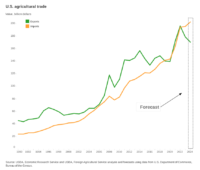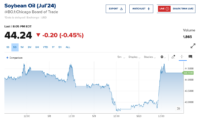Bloomberg's Clarice Couto reported this past Friday that "a surprising tax change in agriculture powerhouse Brazil has the potential to make soy grown in the world’s largest bean exporter less…
Amid Kremlin Grain Port Attacks, Farmers in Ukraine Cut Planting Area; as Midwest “Crop-Friendly” Weather Unfolds
Bloomberg writer Aine Quinn reported today that, “Major Ukrainian farm companies are curbing winter crop plantings after Russia blocked the main Black Sea export route, hitting world food supplies for the next two years.
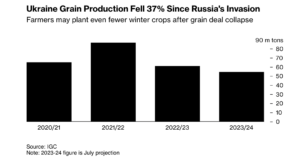
“The options for farmers who made Ukraine a global breadbasket are narrowing as the economics of their business deteriorates.
They have limited storage space as this year’s harvest piles up, while an alternative shipping corridor along the Danube is expensive and lacks capacity.
“Grain ports on the river are also being attacked by Kremlin drones.”
Quinn explained that, “So far, the exact impact on the winter planting area for wheat, barley and rapeseed is unclear as rains are delaying harvesting of the previous crop. August and September are a key period for Ukraine’s winter-crop plantings. Fields will lie dormant during the coldest months, before restarting growth in the spring.
“The country’s total grain production has already fallen 37% this year compared with pre-war levels, according to the International Grains Council.”
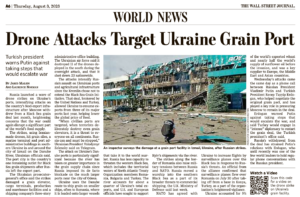
Jared Malsin and Laurence Norman reported in today’s Wall Street Journal that, “Russia launched a wave of drone strikes on Ukraine’s ports, intensifying attacks on the country’s food-export infrastructure after Moscow withdrew from a Black Sea grain agreement last month, heightening concerns that the war could again disrupt a significant portion of the world’s food supply.
“The strikes, using Iranian-made Shahed-136 drones, hit grain silos, a marine terminal and port administrative buildings in southern Ukraine in and around the city of Izmail on the Danube River, Ukrainian officials said. The port city is the country’s one remaining outlet for Black Sea grain shipments after Russia left the export deal last month.”
These photos show the lives of hundreds of millions of people. In Ukraine, in Europe, in Africa. The photos show the destroyed infrastructure of the ports of the Danube cluster. Last night, Russia attacked them with Iranian drones. These are the very ports that have become the… pic.twitter.com/DFCI2muwEC
— Oleksandr Kubrakov (@OlKubrakov) August 2, 2023
The Journal article pointed out that, “NATO agreed with Ukraine last week to increase flights by surveillance planes over the Black Sea in response to Russia’s threats. An official from the alliance confirmed that surveillance planes flew over Romania on July 30 after taking off from a base in the city of Konya in Turkey as a part of the organization’s heightened vigilance.”
“Last week, a senior European Union official said he believed that by September, Ukraine could use EU routes to export enough grain to replace the amounts it was selling through the Black Sea Grain initiative,” the Journal article said.
More than 40,000 tons of grain were damaged by a russian attack in Izmail, Odesa region.
— Defense of Ukraine (@DefenceU) August 2, 2023
This grain could have fed millions of people in China, Israel, and many African countries. Terrorists can use starvation as a weapon. russia has demonstrated this once more. pic.twitter.com/6ZjOihAwZe
And Valerie Hopkins reported in today’s New York Times that, “In the two weeks since Russia’s withdrawal from the grain deal, Russian attacks have destroyed 180,000 tons of grain, 26 port infrastructure facilities and five civilian vessels, according to Ukraine’s foreign ministry. With the attacks on Izmail on Wednesday, that brings the total grain losses to around 220,000 tons….[and]…The destroyed grain could have fed 810,000 people for a year, according to U.N. World Food Program calculations.”
Today’s article pointed out that, “Gennadiy Ivanov, the director of BPG Shipping, a Ukrainian shipping company that manages grain-carrying vessels, said there was currently a backlog of about 100 vessels in Ukraine’s Danube River ports, and congestion will likely only get worse if more infrastructure is attacked and damaged.”
The Times article added that, “After the drone strike on Reni last week — which destroyed 2.5 tons of grain, damaged two hangars and injured seven people — farmers like [Valentin Pavlenko] are worried that even this backup route will be cut off.”
Russia continues its air attacks on Kyiv, Odesa and on Ukrainian Danube ports.
— Josep Borrell Fontelles (@JosepBorrellF) August 2, 2023
These targeted attacks on Ukrainian grain infrastructure aggravate global food insecurity, putting millions of the most vulnerable at risk.#StandWithUkraine #FoodisNotAWeapon
Meanwhile, New York Times writers Safak Timur, Ivan Nechepurenko and Matthew Mpoke Bigg reported yesterday that, “Turkey’s president has called on Russia and Ukraine to avoid escalating their conflict and urged the resumption of a deal that had enabled Ukraine to export its grain across the Black Sea, President Recep Tayyip Erdogan’s office said on Wednesday after he spoke by telephone with his Russian counterpart, Vladimir V. Putin.”
“Mr. Erdogan said that Turkey was working to restore the Black Sea deal, which it helped broker along with the United Nations last summer…[however]…In its own statement about the call, the Kremlin repeated its position that it would be willing to rejoin the agreement only if its conditions were met, signaling that its stance has not changed since it terminated the deal,” the article said.
Russia’s attacks on civilian and port infrastructure in Odesa, Izmail, and Reni devastate places where people live and work. As Russia continues to weaponize food, these escalatory attacks also represent a total assault on Ukraine’s ability to get badly needed grain to people… pic.twitter.com/gs3zQPflVK
— Ambassador Bridget A. Brink (@USAmbKyiv) August 2, 2023
Dow Jones writer Kirk Maltais reported yesterday that, “The intense Russian offensive against Ukraine’s food-exporting infrastructure provided support for CBOT corn and wheat futures [Wednesday] morning, although that support quickly faded.”
And Bloomberg writer Tarso Veloso Ribeiro reported yesterday that, “Soybean futures fell as US forecasts for wetter and cooler weather in the Midwest in the coming weeks raised harvest prospects.
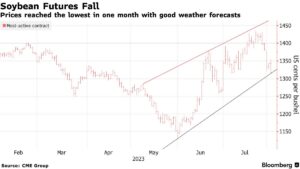
“The oilseed for November delivery fell as much as 2% Wednesday in Chicago to its lowest level since the end of June as the weather outlook lifted hopes for a bigger US crop.”
Aug. 8th - 12th, Outlook. pic.twitter.com/2cc3Wt4OuZ
— FarmPolicy (@FarmPolicy) August 2, 2023
Today, Reuters writer Naveen Thukral reported that, “Chicago wheat futures slid on Thursday to a three-week low as expectations of strong exports from Russia eased some of the concerns arising from attacks on a Ukrainian port.
“Soybeans fell for a second session, while corn lost more ground as pressure from crop-friendly weather in the U.S. Midwest weighed on prices.”
Elsewhere, Reuters News reported yesterday that, “Nutrien on Wednesday decided to indefinitely pause its ramp-up plans for potash production and halt work on its clean ammonia project at Geismar, Louisiana, as the world’s biggest fertilizer producer grapples with falling prices.”






